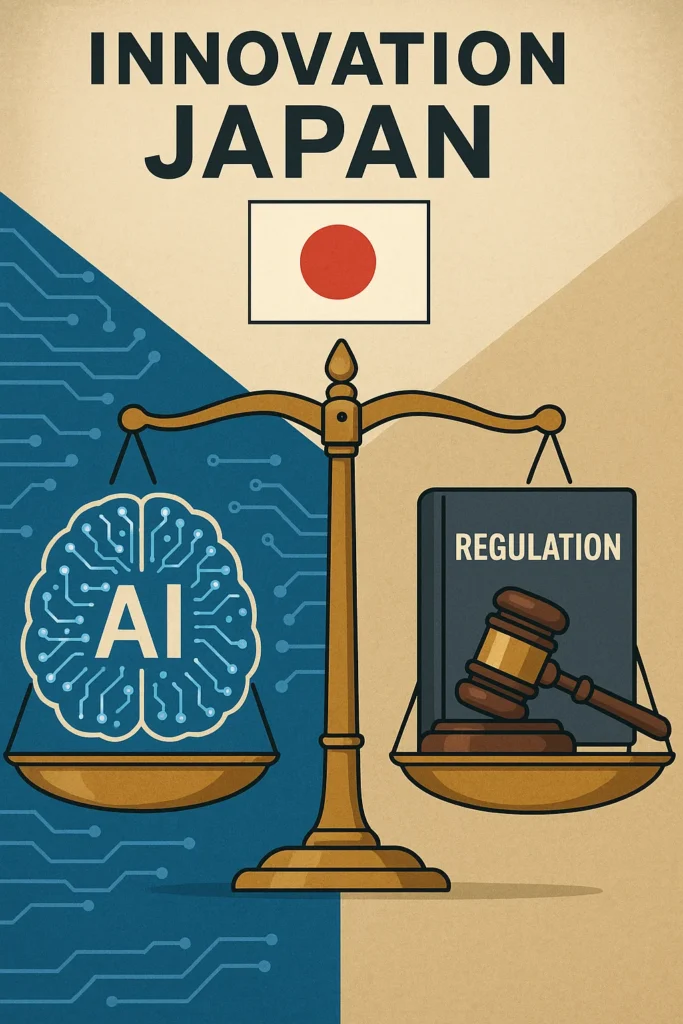In a world where artificial intelligence is outpacing regulation and headlines are dominated by lawsuits, misinformation, and rogue AI tools, Japan has taken a bold, and arguably a refreshing step. On May 28, 2025, the Japanese Parliament passed its first-ever law dedicated solely to Artificial Intelligence. But unlike Europe’s hardline AI Act or the United States’ still-fragmented approach, Japan isn’t swinging a regulatory hammer. Instead, it’s striking a calculated balance: foster innovation, yes, but not at the cost of human rights, accountability, or ethical oversight. Framed around transparency and soft enforcement, the law empowers authorities to investigate AI misuse and publicly name violators, signaling a shift from voluntary guidelines to formal guardrails. While critics call it “toothless” without criminal penalties, others see it as Japan’s strategic play to become a global AI leader without alienating its citizens or its startups.
The Genesis of Japan’s AI Legislation
On May 28, 2025, Japan’s Parliament passed a bill establishing a legal framework to promote AI development and mitigate associated risks. The legislation received bipartisan support, underscoring a national consensus on the importance of responsible AI integration into society.
The law empowers the government to investigate AI-related incidents that infringe upon citizens’ rights and interests. In cases of serious violations, authorities can advise and instruct implicated businesses and disclose their names to the public. Notably, the law refrains from imposing criminal penalties, opting instead for a “name and shame” approach to encourage compliance without stifling innovation.
Key Provisions and Regulatory Mechanisms
The legislation introduces several critical components:
- Designation of AI Developers: Entities developing specific AI infrastructure models must notify competent authorities and establish systems to ensure the safety of AI development.
- Compliance Reporting: Designated developers are required to periodically report their compliance status, subject to government audits and potential corrective measures.
- Public Disclosure: In instances of AI misuse leading to human rights violations or other malicious activities, the government can publicly disclose the names of responsible businesses.
- Strategic AI Team: A dedicated team comprising Cabinet ministers will draft a basic policy on AI to strengthen Japan’s competitiveness in the field.
International Collaboration and Ethical Commitments
Japan’s AI legislation aligns with its commitment to international cooperation on AI governance. In February 2025, Japan signed the Council of Europe Framework Convention on Artificial Intelligence and Human Rights, Democracy, and the Rule of Law, becoming one of the first non-European countries to do so. This treaty underscores Japan’s dedication to upholding fundamental values in AI development and complements domestic efforts to create an innovation-friendly yet ethically grounded AI ecosystem.
Addressing Privacy and Data Utilization
Recognizing the importance of data in AI development, Japan is considering amendments to its privacy laws to facilitate the use of personal information in AI training, particularly in healthcare. Proposals include easing consent requirements for collecting sensitive data, provided it is anonymized and used solely for AI development purposes.
Legal experts, such as Takashi Nakazaki and Takafumi Ochiai, are advising the government on establishing standardized data-sharing frameworks that balance innovation with privacy protection.
Implications for AI Developers and Businesses
The new law signals a shift from voluntary guidelines to enforceable regulations, emphasizing accountability in AI development. While the absence of criminal penalties may raise concerns about enforcement efficacy, the reputational risks associated with public disclosure serve as a deterrent against AI misuse. Businesses operating in Japan must now navigate a more structured regulatory environment, ensuring compliance with safety standards and ethical considerations in AI deployment.
Conclusion
Japan’s AI legislation represents a significant step toward responsible AI governance, balancing the imperatives of innovation and ethical integrity. By establishing clear guidelines and accountability mechanisms, Japan sets a precedent for other nations grappling with the challenges of integrating AI into society.
As AI continues to evolve, Japan’s approach offers a model for harmonizing technological progress with the safeguarding of human rights and democratic values.
REFERENCES:
https://www.japantimes.co.jp/news/2025/05/28/japan/japan-ai-law/
https://www.aa.com.tr/en/asia-pacific/japan-passes-ai-law-targeting-misuse-risks/3581601

